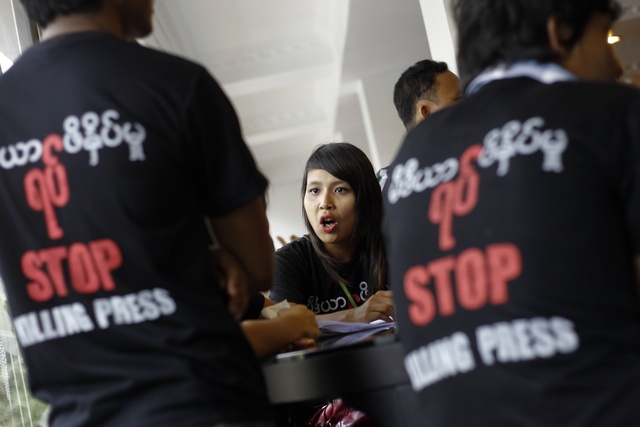The Burmese government announced on Monday that it has abolished pre-censorship of its media, but local papers say they have been issued a strict set of guidelines that forbid them from criticising the state.
“Censorship for all local publications is lifted from August 20, 2012,” said a statement on the Ministry of Information’s website.
But Burma’s notorious censorship board has circulated a draconian set of guidelines to local news journals, warning editors that “the state shall not be negatively criticised.”
The 16-point document, seen by DVB, also prohibits “wording that encourages, supports or incites individuals and organisations that are dissident to the state”, as well as “things that will damage ties with other countries.”
The censorship board – or Press Scrutiny and Registration Division (PSRD) – will continue to monitor all media output, and editors who flout the new guidelines risk prosecution under Burma’s existing laws.
“We don’t need to send our stories to the censorship board anymore, but we still need to send the printed copies to the PSRD after publication,” a senior editor of the Myanmar Times told DVB.
With Burma’s new media law still in draft, publications remain subject to the 1962 Printers and Publishers Registration Law, as well as the Electronics Act, which have been used in the past to silence journalists in Burma.
The PSRD has reportedly cautioned the Myanmar Times that although there will be “less restrictions” they will “need to be more careful and responsible”, sparking fears of an increase in self-censorship.
Burma still upholds criminal defamation laws, which could see editors imprisoned for up to two years for opaque reasons. In March, the Burmese Ministry of Mines filed a lawsuit against the Voice news journal for publishing allegations of corruption against the department.
In recent weeks, the government has come under fire for suspending the Voice and Envoy news journals for “violating regulations” without providing any further explanation, although it was widely believed to concern reporting about an anticipated cabinet reshuffle. The two publications were reinstated after local journalists organised mass rallies against the decision.
Similarly, the government was forced to postpone the formation of a new interim press council, set to replace the PSRD, after being deluged with criticisms from members of the media over its restrictive provisions.
“We cannot perform the censorship board’s job,” Vice-Chairman of the Myanmar Journalists Association told the Irrawaddy last week.
Deputy Director of the PSRD, Tint Swe, told DVB today that while these concerns were currently being discussed with Information Minister Kyaw San, it was not clear how they would be addressed.
Burma’s new draft media law is expected to be presented to journalists in the coming weeks before being discussed in parliament. The Information Ministry has previously been criticised for drafting the legislation without any transparency or media input.
Additional reporting by Shwe Aung



